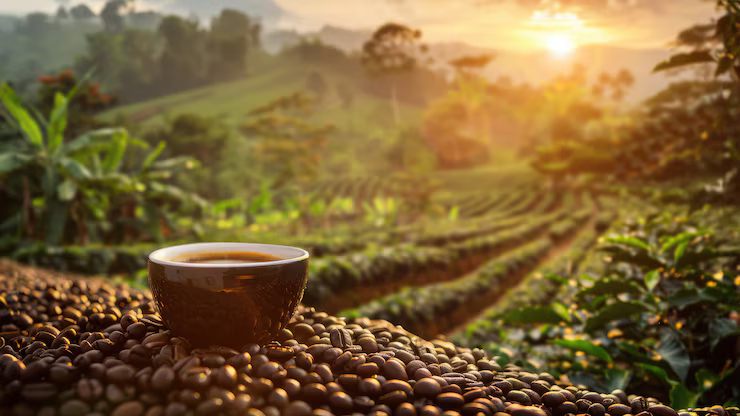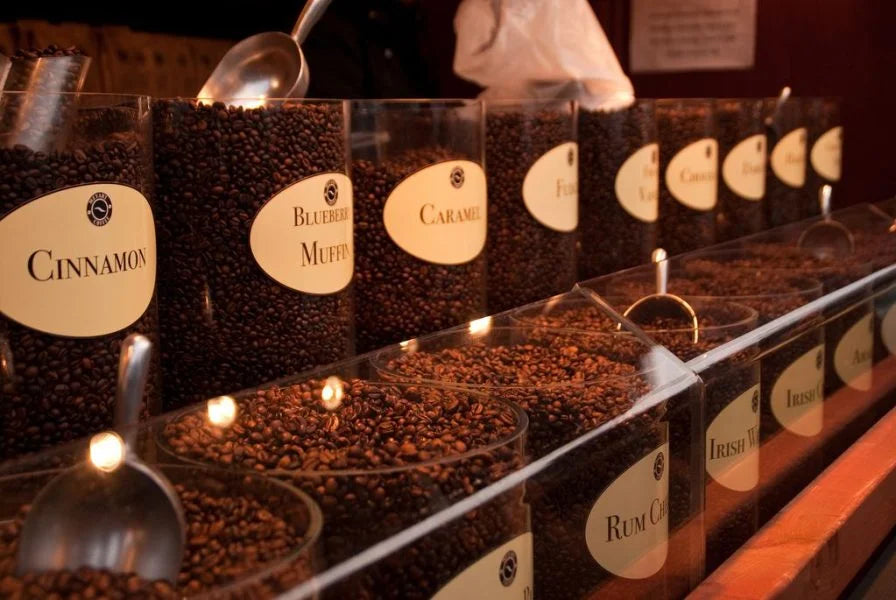
Is Organic Coffee Worth It? A Deep Dive into Bean Quality & Health Benefits
Introduction
In an increasingly health-conscious and environmentally aware world, the spotlight often turns to the choices we make, from the food on our plates to the beverages in our cups. Among these, coffee, a beloved daily ritual for millions, has found itself at the center of a growing debate: Is organic coffee truly worth the hype, and often, the higher price tag? As consumers, we're constantly bombarded with labels and claims, making it challenging to discern what genuinely benefits our health and the planet. This comprehensive deep dive aims to cut through the noise, exploring the intricate world of organic coffee. We will meticulously examine what sets organic beans apart, delve into the purported health benefits, scrutinize the impact on bean quality, and consider the broader environmental implications. By the end of this exploration, you'll be equipped with the knowledge to make an informed decision about whether organic coffee aligns with your values and preferences.
Understanding Organic Coffee
At its core, organic coffee is defined by its cultivation and processing methods, which strictly prohibit the use of artificial chemical substances. Unlike conventional coffee, which often relies on synthetic fertilizers, pesticides, and herbicides to maximize yield and control pests, organic coffee is grown in harmony with nature. This commitment to natural processes is not merely a marketing claim; it is backed by rigorous certification standards. In the United States, for instance, the United States Department of Agriculture (USDA) oversees the certification of organic coffee crops. This involves adherence to specific guidelines, such as cultivating coffee on land that has been free from synthetic pesticides or other prohibited substances for at least three years prior to harvest [1].
Beyond the absence of harmful chemicals, organic coffee farming emphasizes sustainable practices that nurture the ecosystem. This includes maintaining a sufficient buffer zone between organic and conventional crops to prevent cross-contamination. Furthermore, organic farms implement sustainable crop rotation plans, which are crucial for preventing soil erosion, replenishing vital soil nutrients, and naturally controlling pests without resorting to chemical interventions [1]. These practices contribute to a healthier environment for the coffee plants, the surrounding biodiversity, and the farmers themselves.
The distinction between organic and conventional coffee extends beyond the farm. The Organic Food Production Act of 1990 (OFPA) in the U.S. also regulates how organic coffee beans are handled throughout the production process, ensuring that no prohibited substances are introduced post-harvest [1]. This holistic approach, from seed to cup, is what truly differentiates organic coffee and forms the foundation for its potential benefits.
The Health Benefits: Beyond Just "Organic"
The allure of organic coffee often stems from the promise of a healthier cup, free from the chemical residues found in conventionally grown beans. This promise holds significant weight, as organic cultivation practices inherently lead to a reduced exposure to synthetic pesticides, herbicides, and fertilizers. These chemicals, commonly used in conventional farming, have been linked to various health concerns, and minimizing their intake is a primary driver for many consumers opting for organic [2].
However, the health benefits of organic coffee extend beyond simply avoiding harmful substances. Organic coffee is frequently lauded for its potentially higher antioxidant content. Antioxidants are crucial compounds that combat free radicals in the body, which are unstable molecules that can cause cellular damage and contribute to chronic diseases. While all coffee is a rich source of antioxidants, some studies suggest that organic cultivation methods, which often involve healthier soil and less chemical interference, may lead to a more robust antioxidant profile in the beans [3]. Furthermore, organic coffee may contain higher levels of essential nutrients such as magnesium, potassium, and B vitamins, contributing to overall well-being [3].
It's important to address common concerns that arise even with organic coffee, such as the presence of mold and mycotoxins. While organic certification focuses on cultivation practices, it doesn't inherently guarantee the absence of these naturally occurring contaminants. Mycotoxins, produced by certain molds, can develop if coffee beans are improperly processed or stored. Therefore, discerning consumers should look for organic coffee brands that go the extra mile by implementing rigorous quality control measures, including third-party testing for mold and mycotoxins [4]. Similarly, the roasting process plays a critical role in the final health profile of coffee. Improper roasting at excessively high temperatures can lead to the formation of harmful byproducts like acrylamide. The healthiest organic coffee brands often utilize specialized roasting techniques, such as small-batch roasting in smokeless machines, to minimize these compounds and preserve beneficial antioxidants [4].
In essence, while the organic label provides a strong foundation for a healthier coffee choice by eliminating synthetic chemicals, a truly health-conscious decision involves looking beyond just the organic certification. Prioritizing brands that also focus on bean quality, proper processing, and rigorous testing ensures a cup that is not only free from unwanted chemicals but also rich in beneficial compounds and free from potential contaminants.
Bean Quality: Does Organic Mean Better Taste?
The question of whether organic coffee inherently tastes better than its conventional counterpart is complex and often subjective. While organic certification focuses on the absence of synthetic chemicals and sustainable farming practices, it doesn't directly address the nuanced characteristics that define a coffee's flavor profile, such as acidity, body, aroma, and specific tasting notes. These attributes are typically evaluated by organizations like the Specialty Coffee Association (SCA), which grades coffee based on its sensory qualities and absence of defects [5]. A coffee can be organic without being
specialty grade, and vice versa. However, there are compelling arguments for how organic practices can indirectly contribute to superior bean quality.
Organic farming methods often foster a healthier growing environment for coffee plants. For instance, many organic coffee farms practice shade-growing, where coffee plants are cultivated under a canopy of trees. This traditional method protects the coffee cherries from harsh sunlight, allowing them to ripen more slowly and develop a richer, more complex flavor profile. Shade-grown coffee also contributes to biodiversity and soil health, creating a more resilient ecosystem [6]. The use of organic fertilizers, such as compost and coffee pulp, enriches the soil with vital nutrients, leading to stronger, healthier coffee plants that can produce higher-quality beans [1]. The absence of chemical interference means that the natural flavors and aromas of the coffee are allowed to develop unhindered, resulting in a cleaner and more authentic taste.
However, it's crucial to understand that
while organic practices can contribute to better bean quality, they don't guarantee it. Consumers seeking truly high-quality organic coffee should look for brands that not only carry organic certification but also emphasize:
- Specialty-Grade Designation: This indicates that the coffee has been professionally graded and meets high standards for flavor, aroma, and absence of defects. Many organic coffees are indeed specialty-grade, but the organic label alone doesn't confirm this [5].
- Transparent Sourcing: Brands that are transparent about their sourcing, including the specific farms or regions, often prioritize quality and ethical practices.
- Third-Party Testing for Purity: As mentioned in the health benefits section, even organic coffee can be susceptible to mold and mycotoxins. Reputable brands will often conduct third-party lab testing to ensure their beans are free from these contaminants, further contributing to a clean and pure flavor [4].
- Proper Roasting Techniques: The roasting process significantly impacts the final taste. A skilled roaster can bring out the best in high-quality organic beans, while improper roasting can diminish their potential. Look for brands that highlight their roasting philosophy and commitment to quality.
In summary, while organic certification is a strong indicator of responsible farming and the absence of harmful chemicals, it's not the sole determinant of superior taste. For the best experience, seek organic coffees that also meet specialty-grade standards and are backed by transparent sourcing and rigorous quality control.
Environmental Impact & Sustainability
The environmental advantages of organic coffee cultivation are perhaps some of its most compelling arguments. Unlike conventional farming, which can lead to significant ecological degradation through the widespread use of synthetic chemicals, organic coffee production is deeply intertwined with principles of sustainability and ecological balance. This approach fosters a healthier planet, from the soil beneath our feet to the air we breathe.
One of the most significant ecological benefits is the promotion of biodiversity. Organic coffee farms often employ traditional methods like shade-growing, where coffee plants thrive under a canopy of diverse trees. This practice mimics natural forest ecosystems, providing vital habitats for a wide array of plant and animal species, including migratory birds. These birds, in turn, contribute to the ecosystem by controlling pests and naturally fertilizing the soil, reducing the need for chemical interventions [6]. This stands in stark contrast to sun-grown conventional coffee, which often requires deforestation and leads to monoculture, diminishing biodiversity.
Furthermore, organic farming practices significantly improve soil health. The reliance on organic fertilizers such as compost, coffee pulp, and animal manure enriches the soil with organic matter, enhancing its fertility and structure. This not only provides essential nutrients for the coffee plants but also improves water retention and reduces soil erosion, particularly in hilly coffee-growing regions [1]. Healthy soil acts as a carbon sink, sequestering atmospheric carbon dioxide, which plays a crucial role in climate change mitigation. By avoiding synthetic pesticides and herbicides, organic farms prevent these harmful chemicals from leaching into groundwater and contaminating local water sources, thus protecting aquatic ecosystems and ensuring cleaner water for communities [6].
The broader picture of sustainability in organic coffee also often extends to ethical considerations and fair trade practices. While not all organic coffee is fair trade certified, there is a significant overlap. Fair trade principles ensure that farmers receive a fair price for their crops, enabling them to invest in sustainable practices and improve their livelihoods. This holistic approach recognizes that environmental sustainability is inextricably linked to social and economic well-being within coffee-producing communities.
In essence, choosing organic coffee is often a vote for a more sustainable and environmentally responsible agricultural system. It supports practices that protect natural resources, enhance biodiversity, combat climate change, and contribute to the long-term health of both the planet and the people who cultivate our coffee.
The Value Proposition: Is the Price Justified?
One of the most common considerations when faced with organic coffee is its price point, which is often higher than that of conventional coffee. This price difference can lead consumers to question whether the added cost is truly justified. To answer this, it's essential to weigh the various benefits against the financial investment.
The higher cost of organic coffee is a reflection of several factors inherent in its production. Organic farming methods are typically more labor-intensive, as they rely on natural processes for pest control, fertilization, and weed management rather than synthetic chemicals. The certification process itself also involves fees and adherence to strict standards, which adds to the overall cost for farmers and producers. Furthermore, organic yields can sometimes be lower than conventional yields, as farmers cannot rely on chemical inputs to artificially boost production [1]. These factors contribute to a higher cost of production, which is then passed on to the consumer.
However, the value proposition of organic coffee extends beyond mere cost. When considering the price, it's important to factor in the intangible benefits:
- Health Investment: For many, the reduced exposure to pesticides and other synthetic chemicals is a significant health benefit. Choosing organic coffee can be seen as an investment in personal well-being, minimizing the intake of potentially harmful substances over time [2].
- Environmental Stewardship: By purchasing organic coffee, consumers directly support farming practices that are environmentally sustainable. This includes promoting biodiversity, improving soil health, protecting water sources, and contributing to climate change mitigation [6]. For those who prioritize ecological responsibility, the higher price reflects a contribution to a healthier planet.
- Ethical Considerations: While not exclusively tied to organic, many organic coffee producers also adhere to fair trade principles, ensuring equitable wages and safe working conditions for farmers. This ethical dimension adds another layer of value, supporting social justice within the coffee industry.
- Potential for Superior Quality and Taste: As discussed, organic practices can foster conditions that lead to higher-quality beans with more nuanced and authentic flavors. For coffee connoisseurs, the enhanced taste experience can justify the premium price.
Ultimately, whether the price of organic coffee is
justified is a personal decision based on individual priorities and values. If health, environmental sustainability, and ethical sourcing are paramount, then the investment in organic coffee offers a clear return in terms of peace of mind and positive impact. If cost is the sole determinant, then conventional coffee may seem more appealing. However, a holistic view reveals that the true cost of conventional coffee might be hidden in its environmental and health externalities.
Conclusion
In the journey to understand whether organic coffee is truly worth it, we've explored its fundamental definitions, delved into its potential health benefits, examined its impact on bean quality, and highlighted its significant environmental contributions. It's clear that organic coffee offers a compelling proposition, moving beyond just a trend to represent a more conscious and sustainable choice.
Organic coffee, by its very nature, minimizes your exposure to synthetic chemicals, a significant health advantage in an increasingly chemical-laden world. While all coffee boasts impressive antioxidant properties, the organic cultivation methods may further enhance these beneficial compounds. Furthermore, the practices inherent in organic farming, such as shade-growing and enriched soil health, often contribute to a superior bean quality, allowing for the development of richer, more authentic flavors.
Beyond personal health, the environmental impact of organic coffee farming is profound. It champions biodiversity, protects vital ecosystems, improves soil health, and plays a role in mitigating climate change. Choosing organic coffee is, in many ways, an act of environmental stewardship, supporting practices that nurture our planet for future generations.
However, it's crucial to remember that the organic label, while powerful, isn't the sole determinant of a truly superior cup. For the discerning consumer, looking for organic coffee that also meets specialty-grade standards, undergoes third-party testing for purity (especially for mold and mycotoxins), and is roasted with care, will ensure the most wholesome and enjoyable experience.
The higher price point of organic coffee reflects the true cost of sustainable and ethical production. It's an investment not just in a cup of coffee, but in your health, the well-being of farmers, and the health of our planet. Ultimately, the decision to choose organic coffee is a personal one, driven by individual values and priorities. But armed with this deep dive, you can now make that choice with confidence and clarity.
Share your thoughts: What are your experiences with organic coffee? Do you find the benefits outweigh the cost? Share your insights in the comments below!


